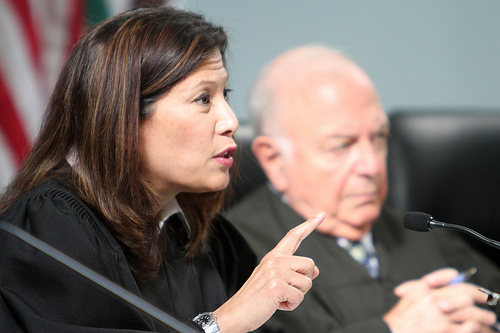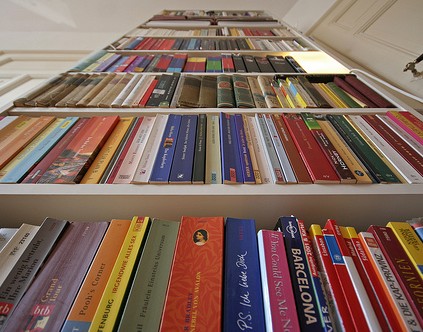Don’t “Write What You Know”—Write What You Long to Write
Today’s guest post is by author Rachel Amphlett:
If there’s one bit of writing advice that riles me, it’s the old adage “write what you know.”
It’s just wrong, especially when handed out to new writers.
Sure, writing what you know is all very well if you’re an ex-serving member of the military, or a cop, a secret agent, or even a cowboy—you have a wealth of exciting knowledge at your fingertips. But what if you can’t draw from an intriguing, exciting vocation?
What if your daytime role is that of a harassed secretary, a gas station attendant, or a bus driver, but you want to write regency romance, or a thriller, or a crime series?
How do you get from your day job to damsel in distress, reluctant hero, explosives expert, FBI agent, or rural police detective?
Research, that’s how. And it doesn’t have to cost you a fortune in money or time. Back in the day, a writer might have traveled far and wide to do the needed research in order to write a novel packed with accurate details. But in today’s world, writers have access to some cost-effective ways within reach to get started.
Here are just a few of my suggestions:
- Local Newspapers: Local newspapers these days are often accessible online. These provide a superb way to get a good indicator of community concerns, seasonal conditions (and how they affect your locale of choice), types of employment common in their region (mining, agriculture, automotive industries), and crime rates.
- Photographs: If you can’t afford to travel, do you know someone who has been there or lived there who can answer your questions? Maybe they will share their holiday photos with you, and share their impressions of the place and people.
- Pinterest is a great place to look for inspiration. You can set up a “pin board” for your writing projects, search the photograph database by subject, and “pin” anything that catches your eye. Pin boards can be saved as “public” or “private.” You can then go back through the photographs if you’re struggling to describe a scene. Mix in a bit of imagination, and off you go.
- Travel Guides: These are great because not only do you gain some historical information about your chosen locale, you’ll get access to maps, details of public transport routes, cafes, restaurants, live music venues, and accommodation options. A guidebook will often contain details of a city’s “must avoid” areas—which of course, you’ll be sending your protagonist into while he is chasing or escaping from the bad guys, right?
- Experts: Start off by asking your own doctor—you’ll be amazed at how eager people will be to help you if you ask. If you need information about any of the emergency services, start off by contacting their media unit. Explain what you’re doing, give them some context, and be specific with your questions.
- Check the media relations pages of your local emergency services websites. There will often be public open days you can attend.
- Finally, watch for career expos that cover a wide range of skills and roles. These are great events where you can wander around for inspiration and make contact. Take some business cards along with you, introduce yourself, and ask if you can e-mail or phone these professionals for help with your research. You’ll be surprised how eager people are to get involved to make sure you get your facts right.
Online Information
There’s a tremendous amount of information available online. Here is a selection of some of my favorites:
- FBI: Any national security service has an enormous task in protecting its citizens, and the FBI is listed here because it provides information about what it does in a very practical and accessible way.
- BBC Magazine:: I’m a news junkie, and I love the BBC Magazine site because it offers a vast range of articles on everything from archaeology to zoology. The problem is, you’ll find yourself getting distracted very easily as there is so much good information here, so be prepared to have your Favorites folder on standby to save all those new story ideas!
- Forensics for Fiction: Run by thriller author Tom Adair, who has a background in forensics, this website covers everything from firing guns underwater to decomposition rates for your murder victims. Tom is very approachable, so if you have a nagging question about what, why, or how within the forensics field, Tom’s your go-to man.
- Geography IQ: This website is designed so that you can look up any country and immediately gain access to information on climate, geographic population growth, military setup, historical overview, and economies.
- How Stuff Works: With headings such as Culture, Auto, Science, Tech and Health, this is the place to go to if you’ve ever wondered how something, um, works. Addictive reading—be warned!
Local Sports Clubs
Want to find out what it’s like to use a bow and arrow? Fire a gun? Have a sword fight? Ride a horse?
Search for local sports clubs. They often have open days and are usually delighted to help. If they don’t have open days, give them a call, explain you’re a local author trying to do some research, and find out if they can offer you an introductory fee to have a lesson or two, or watch a lesson.
Actually, doing the activity that your characters undertake gives you a whole new perspective on what it’s like, and is an immense help—so long as it’s not dangerous, harmful, or destructive! You’ll be surprised what you’ll find once you start looking too. I live in Brisbane, Australia, and there’s even a medieval combat school in my area!
Write what you know?
Pah.
Write what you long to write—and have fun learning new things as you dive into research!
 Rachel Amphlett previously worked in the UK publishing industry, played lead guitar in rock bands, and worked with BBC radio before relocating from England to Australia in 2005.Her first thriller White Gold was released in 2011 and hit the Amazon best-seller lists, as have her subsequent novels Under Fire and Before Nightfall. Join Rachel via her mailing list here on her blog or visit her on Facebook and Twitter:
Rachel Amphlett previously worked in the UK publishing industry, played lead guitar in rock bands, and worked with BBC radio before relocating from England to Australia in 2005.Her first thriller White Gold was released in 2011 and hit the Amazon best-seller lists, as have her subsequent novels Under Fire and Before Nightfall. Join Rachel via her mailing list here on her blog or visit her on Facebook and Twitter:












Excellent advice, Rachel. “What we know” includes our experience with people–families, friends, enemies, bosses–which can be more useful than researched facts. That’s what we ‘know’ and what almost any reader can identify with.
I find that Google Earth is a fine source for all things geographic, even if I’ve have been to the location in my book. I’ve spent a lot of time in the UK and France but I always refer back to GE for anything from finding the distance between two points to making sure I describe the right style of houses in a particular neighborhood.
Russell, you’re so right about Google Earth – I haven’t lived in the UK for over 9 years now so it’s imperative I check that landmarks and roads haven’t changed when I’m writing about particular locations!
Google Earth / maps is absolutely essential. I wrote a thriller set in North Korea (a place I’d never been and therefore most definitely didn’t “know”) and through my research found a MASSIVE kmz file online (North Korea Uncovered) of more things in North Korea than you could possibly ever hope to have as a novelist. I was in heaven
I actually spent more time playing with that than I did writing.
In my latest I used GE to determine the distance from Cairns to Sydney by sea and plotted where a cruiser at 20 knots would be each night.
Definitely, write what you want. Don’t limit yourself to what you “know”
I couldn’t agree more with this! I’m a physician, and although I include medical insights in my crime novels, nothing would be more boring for me than to write a novel set in a clinic in Southern California. I write police procedurals because I LOVE it, but I’ve never been a Chief Inspector in the Criminal Investigations Department in Ghana. That’s where the research comes in
Kwei – I’ve got a few medical experts on my list who I turn to when I need research advice and you’re so right in what you say – if I included everything in my books, it’d be boring. There’s a real need to “tread lightly” as the saying goes. As for police procedurals in Ghana? I’m intrigued…!
Great list of resources –thanks! The internet is such a huge boon for writers, but also a vast ocean of info. Thanks for help in navigating it.
You’re more than welcome Lisa – it’s hard not to get distracted, isn’t it? 🙂
Thanks, Rachel. Talent and desire can reach out to so many facets of living and your piece
stresses that with a little research we can be in places we have never been or learn about
lives and careers of people we have never met. The links are so helpful.
Thanks Beth, appreciate the feedback. I find that a little bit of research can take my imagination a long way – often it’s opening that door and taking a peek at what’s around that helps everything fall into place!
Good post, Rachel! “Write what you know” always bothers me too. There is a sense in which it’s right–just not the sense in which a lot of misguided teachers and professors use it.
To me, “write what you know” applies most effectively to emotional experience. Sometimes, you work out your own questions of identity or your ordeal with a broken heart in the context of an epic sci-fi space opera. That is every bit as valid as a quiet character drama directly based upon your experiences. And the best thing about emotional experience is that we all have it. That means we have the necessary background to write authentic human characters in any context.
“Write what you know,” then, should not be taken as a reason *not* to write anything–merely a source from which strong characterization can emerge.
Great points about emotional knowledge as opposed to intellectual knowledge Harrison, and well put. Thanks for your feedback – I felt sure I wasn’t the only one who gets annoyed by the saying “Write what you know”!
Lots of great ideas to give some food to thought 🙂 I’m also a big fan of Wikipedia – even if their articles aren’t always 100% reliable they’re excellent for giving onward links and contacts for individuals and organisations that give additional and expert info on a myriad of subjects.
Hi Jan – I think Wikipedia is a good starting point as long as you find a second or third source to back it up. On the other hand, we have imagination so sometimes an “untruth” is a great way to kick off a plot…
Absolutely, do your homework. If you assume you know something or try to fake it, you’ll be labeled as careless, lazy, or worse. Doing this research can be delightful and you can make friends, too.
Consider citing your sources on an acknowledgement page (make sure they agree to it first). They might buy copies of your work just to show their friends.
You’re right Curtis – it IS fun doing the research and finding out new things. As you say, you never know who you’re going to meet along the way and they often become champions for your writing too.
Hey, Thanks for taking the old adage and turning it upside down. I have told many people that writing what you know simply isn’t enough. Most of us write from our imagination and our creativity. Embedded in that creative mind are many things we can write about–things we didn’t realize we knew.
Using the research tools you suggest is a great way to learn and to expand one’s writing. Indeed, fact checking is critical for all writers, even fiction.
Thanks Joan – agree with what you say. Without research, our writibg would become very tired, very quickly!
I’ve always thought the “write what you know” advice is silly. How are you supposed to know about another galaxy, the distant past before you were born, a world inhabited by elves, giants, and dragons … How are you supposed to know the inner life of a woman if you’re a man; the inner life of a Gay person if you’re straight? We would have some dull books indeed if fiction writers wrote only what they know.
Interesting and compelling fiction comes from the imaginations of writer who are not afraid to go where they have never been. Anyway, our dreams and imaginations are a part of a part of who we are, and therefore a part of “what we know.” I completely agree that research provides authenticity to a writer’s creative imaginings. Thanks.
I’m so glad you mentioned sci-fi and fantasy Lamont, because I’ve always felt that “write what you know” is particularly silly when talking about those genres! With sci-fi, authors have often foreseen (through extensive research) inventions that took decades to be realised by science, so it shows how great an imagination can be!
Rachel,
Really appreciate your post. I developed a love of reading from sci-fi and other highly imaginative stories. I think academics and literary critics snobbishly overlook sci-fi. And I’ll go to my grave believing Stanislaw Lem would’ve gotten a Nobel Prize in Literature if he had not been classified as a lowly science fiction writer. The Cyberiad and The Futurological Congress are two of my favorite novels; I’m fairly sure Lem didn’t “know” any of those characters, places, or events until he imagined them. Come to think of it, not many of my favorite fiction writers wrote stories about what they know—unless they’re really from some other galaxy or are time travelers.
Another nail in the “write what you know” coffin is the fact that many noted writers swear they do not know what they’re writing until after they have at least a first draft.
Until your post, I was beginning to think I was the only one! Not that I cared :}
Best to ya.
Lamont – my other half is a huge sci-fi fan and he’s even managed to get me to read some (I love sci-fi films!). He keeps telling me that I should read Peter F Hamilton because the man’s imagination is so good, and no doubt, prescient! Cheers,
Not going to use this as a message board, but thank you for the information. I’d never heard of Peter F. Hamilton. So, I looked him up and discovered he writes a sci-fi subgenre called “space opera.” Didn’t know that term before today, even though it’s been used for over seventy years. Always good to learn something new, and to find another fiction writer I might read someday. Thanks.
Forgot to mention how are you suppsed to know about the future if you write only what you know? I’ll add your suggested research websites to what I already have. Thanks.
The advice of ‘write what you know’ confused me until it hit me that what you really need to know is the emotional content for your writing. It’s difficult to write emotions you haven’t experienced. I’d never tackle something like the loss of a child–that’s not in my emotional vocabulary. But there are lots of things that I have experienced that give me more than enough stuff to write about.
I agree Shannon – I don’t think I’m ever going to be running short on ideas!
Great advice! I have two photo books of El Salvador and they are a great help to me. They say El Salvador’s civil war is (or was) the most photographed war in the world. Probably the one where the most journalists were killed too. I would be curious to find out some of these figures so I will take you up on some of your other advice.
I will say though, I do believe it is best to have spent some time in the location of your novel or story. It just adds little tidbits but might otherwise not be known. For instance, when I lived in New Orleans, there were mornings that the fog was so heavy, everything glowed. It was magical! I hope to find a place to describe it in my next novel.
Sherrie
https://www.kickstarter.com/projects/1946619846/secrets-and-lies-in-el-salvador-is-the-novel-i-am
I love to travel Sherrie, so if I can draw on a previous vacation to lend a real sense of place to my writing, I do. I think it’s important to recognise though that not everyone gets the chance to travel, so using online resources is the next best thing. Additionally, even trying out some recipes from a country you may be writing about helps to evoke a sense of place – and is a great excuse to have some friends round for a dinner party!
Rachel, that’s great — the “write what you know” cliche is one of several common pieces of writing that are half-right, half-wrong. Other advice, such as “show, don’t tell” and “use the active voice” are great, but you’ll drive yourself crazy if you NEVER “tell” or NEVER use passive voice. And even the advice to do research has its limitations. For example, C.S. Lewis, I am sure, did zero scientific research on Mars and Venus when he wrote his space trilogy, and from a scientific viewpoint the novels are totally implausible. But the stories have great depth because he worked with what he knew — the classical mythological symbolism of Mars and Venus are woven all through the novels.
Thanks Dave – I’ve found that I get so wrapped up in all the advice, I sometimes worry too much about the writing. I’ve always been told, for example, not to use “was” because apparently that’s showing, not telling. Then I started re-reading some of my favourite thriller writers such as Lee Child, Vince Flynn, and Robert Crais – and guess what? Needless to say, I’ve decided my New Year’s resolution will be to throw the rule book out the window – care to join me? 🙂
You’re missing the point. After you have done enough research, then you “know” the subject. It doesn’t matter how you get knowledge, formal or informal education (historical fiction writers do a lot of this), life experience, or whatever. Everything you are talking about is informal education. Once you obtain enough knowledge, you “know”. What about fantasy? Well, first the writer gained a lot of knowledge from reading books of that genre, then created their own world. They “know” that world because they had to create the details of it to make it real. So, yes, you can only write what you know.
Don,
“You’re missing the point.” Really? Not trying to start an argument, but I doubt any of us point getters are missing anything at all. I sent my reply to your comment as a regular comment instead of a reply. It should be below this one.
Wishing ya the best.
“You’re missing the point.” That’s interesting. The point is that Rachel, and others commenting on her post, mention the importance of life experience, imagination, research, and pleasure reading. In fact, Rachel has a list of websites to help with research. Telling a new writer to “write what you know” can be discouraging. Explaining to new writers the importance of research, and showing them how to start doing it, is encouraging. That’s the point.
I’ve been interested in fiction writing for many decades. And, yep, I have an MS in Writing & Publishing. I’ve never heard a writing instructor recommend to new writers “write what you know” and mean “write what you’ve learned, or what you’ve experienced, or what you’ve researched.” If writing instructors really mean something other than “write what you know,” they could state it clearly instead of letting writers wait years for a blog post to decipher their former instructors’ cryptic message. When writing instructors toss asinine advice to new writers it’s because they are talking down to them. That happens a lot. And that’s the point.
Great advice. I’ve been telling new writer’s that in my lectures for years. I’m a writer of fantasy and historical westerns. And although my hair may be gray (or silver depending on the light) I obviously haven’t lived that long. But research allows me to go to other worlds or the past if only in my mind. Being a historian and museum director has helped as I learn facts and stories as well deal with antiques that were once items of the times. I hadn’t thought of sports clubs, good idea. My favorite are re-enactors or living history enthusiasts as they like to be called. Most often their research is intricate and if they are a first-person re-enactor, it is as if you’re talking to someone from the past. I still get chills when at a World War II event the radio cut out and after a few seconds silence, they broadcast the news that Pearl Harbor had been attacked. For the entire broadcast, not a single person amongst the tens of thousands there spoke. Despite it being decades later, it was as if we were there. And this was before 9-11 so there was no common ground.
Thanks for the research tips and the advice to “write what you don’t know.”
What a great story Helen – and what a great job to have as museum director! I think I get my love of research from my dad who has researched (and published the stories of) the WWII names of three war memorials to date. His research was undertaken by speaking to those that remembered the people that lost their lives as well as delving into archived records. As for reinactment groups, they’re great – when I was at school there were often trips to meet our local “Sealed Knot” group who specialised in the English Civil War and provided a fantastic hands-on experience for people.
I do so agree–“writing what you know” can be very restricting for people who are young, inexperienced, and/or led a sheltered life. (All three, right here.) There is something to be said for writing what you do know, but I’m thinking more in terms of emotions and experiences than actual plot details–e.g., I find it easy to write from the perspective of a character who feels isolated, having been so for years due to illness. It does bring the story to life, even if the character’s situation is completely unlike anything I have every experienced myself. On the other hand, any good writer can expand their imagination beyond what they personally have experienced. I’ve little experience in romance, but judging from feedback, I’ve been successful in my romantic depictions.
Having rambled through all that, I admit I haven’t researched much for my novels, but that’s mainly because they’re still at the first-draft stage. I am, however, no stranger to research thanks to fan fiction, and have Googled everything from the symptoms of pneumonia and when people first said “okay”, to mental health in the criminal justice system and currently active volcanos. I have ran hundreds of random words through Google translate and I have used Traveline and TFL’s journey planners for fictional journeys almost as much as my own.
Which brings me to a problem I have–I cannot find anywhere online where I can find out about transport in the past. Roads and rail etc is changing all the time, so how am I supposed to know if the journey I write about would actually have been possible in the 70s, 80s, 90s, or even a decade ago? There’s a useful website which can convert any currency into its equivalent in any time period ( http://www.thisismoney.co.uk/money/bills/article-1633409/Historic-inflation-calculator-value-money-changed-1900.html ), but there’s no such thing as a historical journey planner that I can tell. If anyone knows of such a thing (or feels like making one!) do let me know. It would be most helpful.
Sorry, should have said, not ANY time period–any time since 1901. So not as helpful as it looks. But still, I’ve found it helpful.
Hi Alex – there are old travel guides still available (in Europe anyway) that cover things train travel and time tables and info about destinations. For that there’s Bradshaws Guide which is still available online (www.amazon.co.uk/dp/1908174056) and has been the subject of a couple of BBC travel documentary series (www.youtube.com/watch?v=J4FvAWoMpdE) – that one’s based on a 1930s guide and they have most of the other series on there too.
There’s also more famous general Travel Guides from the turn of the 19th C like Baedekers (/en.wikipedia.org/wiki/List_of_Baedeker_Guides) which were featured in the Merchant Ivory movie for Room with a View and were a kind of ‘Rough Guide’ for travellers at that time. That wiki page lists some guide for the US and Mexico.Caribbean around between 1899 and 1909. Worth a quick look and may turn up some more avenues to pursue for you 🙂
Wow – I love that historical currency converter Alex, many thanks for sharing that. Looks like Jan might have been able to pass on some useful information too – thank you!
Great post! I feel like “Write what you know” is what gets us a whole lot of books with authors as the main character. I don’t mean to insult anybody but…boooring.
Depends on the story! But a lot of novels by a lot of first-time authors, at least in the early stages (when editors like me see them), feature idealized versions of the author. And *that* is boring, because an idealized character has no flaws, and we need flaws to create engaging, human characters.
Well put 🙂